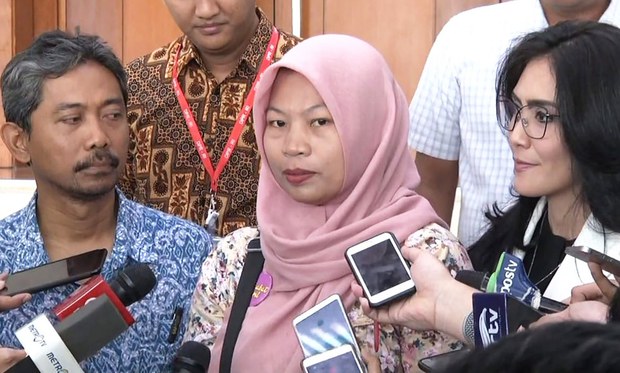Indonesia: Presidential Amnesty Shines Spotlight on Internet Laws, Harassment
2019.07.17
Jakarta
 Baiq Nuril Makmun (center), accompanied by her lawyer, Widodo Dwi Putro (left), and lawmaker Rieke Diah Pitaloka, talks to journalists in the parliament office in Jakarta, July 16, 2019.
Baiq Nuril Makmun (center), accompanied by her lawyer, Widodo Dwi Putro (left), and lawmaker Rieke Diah Pitaloka, talks to journalists in the parliament office in Jakarta, July 16, 2019.
Indonesian advocates for free speech and gender equality hailed President Joko “Jokowi” Widodo’s decision to override a Supreme Court ruling and grant amnesty to a woman convicted for making public a recording of her school principal engaging in a lewd phone conversation.
Still, provisions in Indonesia’s online information laws used to prosecute Baiq Nuril Maknun, a former school administrator from Lombok Island, and sentence her to six months should be quashed to shield sexual harassment victims from being caught up in similar court rulings, advocates said.
“[T]his is an appropriate thing to do,” said Anggara Suwahju, executive director of the Institute for Criminal Justice Reform, adding that the legal proceedings against Nuril were problematic from the start.
“She is a victim of sexual abuse,” Anggara told BenarNews. The institute, an independent research group that focuses on reforming Indonesia’s criminal laws and justice system, had recommended amnesty for Nuril before the president authorized it.
In a letter to the House of Representatives (DPR) explaining his rationale for granting amnesty to Nuril, Jokowi said the ruling was “contrary to a public sense of justice” and that her legal options had been exhausted.
“Her action has been viewed as simply a struggle in an attempt to protect her honor and dignity as a woman and mother,” Jokowi wrote earlier this week.
The DPR is expected to meet later this month to take action on Jokowi’s letter to free Nuril.
The lawmakers will respond and likely approve the president’s letter by July 25, just before a parliamentary recess, Deputy House Speaker Agus Hermanto said.
“My sense is that all factions agree, so I hope this won’t take long,” he told reporters.
Earlier this month, the Supreme Court rejected a last-ditch effort by Nuril, 40, to have her sentence and conviction overturned.
The court’s decision provoked a public outcry that put a spotlight on the Information and Electronic Transaction (ITE) law’s lack of protection for women who are alleged victims of sexual abuse. The law has landed regular social media users, government critics and celebrities in jail for defamation and for transmitting content considered to have violated morality.
In 2014, Nuril recorded a phone conversation where the principal at the school where she worked boasted about his sexual escapades. She said the recording was transferred to a computer by a friend and later ended up online without her knowledge.
The principal, who is named Muslim, filed a defamation lawsuit against Nuril after the recording went public, but a lower court cleared her in 2017.
The Supreme Court overturned the acquittal last year, sentenced Nuril to six months in prison for transmitting content that violates morality under the ITE and ordered her to pay a fine of 500 million rupiah ($35,765). Earlier this month the court rejected Nuril’s request for a case review.
‘Miscarriage of justice’
“The ITE law has been used too easily nowadays and this is a cause for public concern,” said Chairul Huda, a criminal justice analyst at the Muhammadiyah University.
“In the cause of Baiq Nuril, it was a miscarriage of justice,” he told BenarNews. “If the president thinks that the application of the law in her case is not correct, he should also grant amnesty to people convicted in similar cases.”
At least 292 cases involving violations of the ITE law were filed in 2018, most of which were defamation cases, according to the Southeast Asia Freedom of Expression Network (SAFEnet).
The law’s provisions on transmission of content that violates morality was supposed to be used against those involved in pornography, according Ellen Kusuma, a campaigner for SAFEnet. The law provides for up to six years in prison for anyone found guilty of online defamation or transmission of content deemed immoral.
“In practice, the article has been used to prosecute victims of sexual harassment, while perpetrators walked free,” she told BenarNews. “These problematic provisions must be annulled to prevent more people from falling victim.”
Nuril, who has not been jailed, was present at a parliamentary session on Tuesday when the president’s letter was read out.
“It’s one step closer (to freedom),” she told reporters.
Her lawyer, Widodo Dwi Putro, said he hoped the presidential amnesty would be a first step in changing the country’s stance on freeing people who do not deserve to be jailed.
“I am optimistic that this will be the first amnesty for non-political prisoners,” he told BenarNews.
Previously, Indonesian presidents granted amnesty to political prisoners and former separatist rebels from Aceh province.
“Hopefully it will become a legal breakthrough in Indonesia, that everyone is equal before the law,” the lawyer said.
Thaufiek Zulbahary, a member of the National Commission on Violence against Women (Komnas Perempuan), said women in Indonesia were not adequately protected against sexual harassment.
She called on the government to pass a bill that would categorize the type of harassment suffered by Nuril as sexual violence.
“Cases like Miss Nuril’s are common but there are no legal provisions against such verbal violence,” Thaufiek said.







